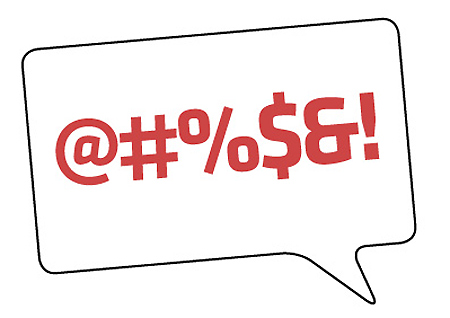How do changes in workplace language effect us and what is the impact of swearing on the %!@x* job?
I am no stranger to the odd expletive. I was recently defrauded by a client and I have to confess that my vocabulary was related to the legitimacy of his parentage, rather than “dash and oh dear”. Generally bad language is not an integral part of my descriptive daily vocabulary, although it would seem, if the media are anything go by, it’s on the increase everywhere, even in the workplace.
But what is the impact of that trend?
Cultural shifts
All languages have swear words, many of which are as old as the languages themselves. Their evolution is cyclical and words which were previously considered acceptable, are now perceived as pejorative. And vice versa. In western society swearing has previously been associated more with men than women.
When I first started working in the steel industry, men complained about women being in meetings because it would mean restricting their language. It was considered inappropriate to swear in mixed company and if that happened it was quickly followed by an apology. Women who swore have always been viewed more harshly than men, simply because they were perceived to have violated more societal taboos which proved to be a deterrent, at least publicly.
Changing times
However, times seem to be a-changing. Bad workplace language is moving away from building sites and fish markets to professional arenas and used by more women. Laura a lawyer in an international law firm confirms that view “ A number of things are going on. Words that were at one time considered to be strong swear words, no longer carry the same taboo as they used to. The “F -word ” is now used quite routinely in my office. It’s common place at a senior level and used in front of and by women. It is no longer considered shocking for a woman to swear”
Whether it’s because they are enjoying freedom of expression, venting , asserting themselves, mimicking male behaviour or the growth of a “laddette” culture she was unable to say.
Mini poll
I did a straw, mixed gender and generation poll amongst a group of friends and associates and this was the general feeling. Light social swearing in many contexts is now very normal practise and considered acceptable in the workplace by both men and women alike, but accompanied by some strong unwritten protocols. I see it frequently even on platforms such as LinkedIn when the f-bomb is dropped without the usual asterisk.
Caveats
These were closely related to the relationships of the people involved and the situation or environment. They also identified a hierarchy of swear words ranging from mildly profane to vulgar and abusive at the other end of the spectrum. It was the final category which my mini poll felt crossed the line into dangerous territory, with the women reacting more strongly than men to specific words. It was interesting that the younger members of my poll of both sexes had a more tolerant attitude than the older members.
Positive impact
However, some studies suggest that swearing at work is not always abusive and can actually have a positive effect helping employees cope with stress, facilitating camaraderie and effective team building. The study into leadership styles, carried out by academics Yehuda Baruch and Stuart Jenkins at the University of East Anglia, warned that attempts to prevent workers from swearing could have a negative impact, although their case studies related primarily to men.
Decline in civility
But there is also a very strong concern that an increased tolerance of swearing in organisations is becoming part of a general decline in workplace communication. This behaviour can even contribute to bullying, discrimination and sexual harassment.
Susan in her mid 30s, with a cross generational perspective works in an investment company where 80% of the department is female, considered both points “My female boss and colleagues are just as likely to swear as the guys and do so frequently! The number of no-go areas particularly amongst younger employees are much fewer than previously. Women feel they can now freely express themselves in the way that men do, but although no one feels harassed or discriminated against, oftentimes it creates an impression of a lack of basic respect which permeates through the department leading to ill feeling and stress.”
So I asked, while I tried to figure out that double standard, can I conclude that although women swear more than before, they don’t actually like being sworn at? “Yes, that’s pretty much my observation. They don’t shrug it off like men do. It’s still not an integral part of our female culture as it is with men, so in certain circumstances it goes down badly and is considered offensive and upsetting.” Susan responded.
Impact on the workplace
In The Cost of Bad Behavior by Christine Pearson and Christine Porath, they suggest that the lack of civility in the workplace, it is far more widespread than people realize and is having a profound negative economic effect to the tune of $300 billion.
With an increased incidence of women openly swearing, and the taboo of men swearing around women disappearing, to what extent does this increased tolerance of bad language contribute to the existence of stressful and hostile working environments?
The CIPD suggests “Employers can ensure professional language in the workplace by having a well drafted policy on bullying and harassment that emphasises how bad language can potentially amount to harassment or bullying.”
But will a workplace handbook be enough? This culture comes from the top. With swearing becoming more socially acceptable across the board in both men and women, how do senior managers define limits, especially in culturally diverse organisations? Or is setting a zero-tolerance policy the only workable solution?
Part of it comes by leading by example from senior men and women alike.
What do you think?
If you have issues of workplace bullying and harassment get in touch NOW






The staff where I am on assignment are very careful not to swear. I seldom hear anything worse than “sugar” or “gosh darnit”. I must admit it’s a weird experience for me. I came from a high-flying non-profit where we got dressed down in language that would make a sailor blush. By the externally appearing demure Southern lady that ran the ship.
I simply feel it’s unprofessional and undermines the credibility of the person who resorts to profanity in a business environment. Senior managers must lead by example. One thing never changes – we always do as the leaders do and not as they say.
-Mike
Thanks Mike for your observations. I agree all organisational culture is driven by the behaviour and values of the leaders permeating from the top down. It will be interesting to see the evolution of this phenomenum in our workplaces against a backdrop of an increasing tolerance of bad language in the outside world..
In general I agree with the notion that leadership and role modeling is important. If the leader uses bad language, then it is to be expected that others will too.
I think too, that while constant bad language in a professional environment is offensive and frankly lacks imagination, the occasional expletive, well placed, can have an impact that works for you rather than against you.
For instance, my husband spent most of his career in the securities industry. He was in constant company with people, men and women, who lived on the edge of the financial markets, every day. Swearing was commonplace among them. In fact if the environment had a colour, it most certainly would have been blue.
In contrast, my husband rarely used bad language of any sort. As the Chief financial officer, he was required to interact with many “Type A” Traders, Managers and Executives, many of whom had little time or patience for “the number cruncher” among them. Every now and then though, when he felt it necessary to get their undivided attention at a meeting, he would come out with a humdinger of a curse word. When he did, the room generally fell silent and all eyes moved in his direction. Before they could recover from the impact of this anomaly, he took his opportunity to present his case and emphasize the importance of what he was asking.
Not sure, but maybe this could be classified as “strategic swearing”.
Very interesting observations, Dorothy. I think the common denominator in ways expletives can actually be employed positively in expressing workplace frustration that isn’t directed towards a colleague. Frustrations with a situation rather than a person, I think, are most widely perceived as less of a violation of accepted workplace dialogue.
I agree Ed – that seems to be what my polsters said. Venting at inanimate objects ( crashed computers and banking call centres were cited more than once ) was well tolerated. Swearing at someone directly crossed over into abuse. Thanks for your input!
Dorothy
Thanks for a thoughtful post.
I agree that one’s choice of words goes to the essence of civility at work. I think that using profanity at work is questionable.
First, doing so assumes that everyone shares the speakers’ tolerance of or enjoyment of profanity. As workplaces have become increasingly diverse in the age and cultural backgrounds of employees, that assumption is shaky. People really do disagree about these things.
Secondly, a lot of profanity has sexual connotations. Many people would prefer to keep such out of their working relationships.
As Pearson and Porath point out in their excellent book, attending to and accommodating the sensitivities of others is at the heart of civility.
All the best,
Michael
http://www.workengagement.com/crew
Thanks Michael for your comment. The results of my unofficial poll coincided with your thoughts – acceptable swearing was focused on inanimate objects or situations – not directly at people. Being sensitive to environments and specific circumstances was also considered important. The women in particular struggled with some words which carried strongly female sexual connotations.
So if I was going to make any non scientific conclusions I had a feeling that acceptable bad language was associated with venting and assertiveness ( strategic). However in mixed cultural backgrounds that is also a bit risky and becomes offensive. Empathy and constructive communication are clearly the best way forward – it’s just a question of how to best to achieve that in rapidly changing times.
Hi Dorothy – this is a great post. I actually left a company because of the amount of swearing from both men and women. This created quite a tense atmosphere and as you say although the women were swearing themselves, they didn’t like it when they were sworn at – especially by men. This was hard to deal with on a daily basis and created a lot of rudness and tension. I was glad to go.
In my debriefing interview I told the HR Manager who seemed quite disinterested – but it did take the company over 6 months to replace me. As organisations become more culturally diverse there needs to be an understanding and accommodation of cultural differences . The company needed senior management to come in and make a ” clean mouth” policy and lead by example.
I admire your posts – you are emerging as a blogging talent
Hi Omer – thanks for your kind words – ” clean mouth” – I like that. Someone else suggested ” clean air policy”
I’m sorry to hear about your experience and hope that you are better settled in your new position.
I thought it was just me…
thanks for this Dorothy. I still cringe when I hear the F word used in a business situation. Michael makes a good point – withouth checking how the others around you feel it is comes across as thoughtless to me.
But maybe I am just too sensitive 🙂
Hi Jackie – no your not being sensitive – thanks for your comment. We all have different boundaries about what is acceptable respectful work place communication . With quite often 4 generations working in the same organisation, it’s possibly just part of a language and workplace evolution, it will settle down when leaders step in and lead by example – at least I think so.
I grew up in a very small town in a very conservative part of the country. Could it be that I actually remember a neighbor (a woman) getting arrested for using the “F” word in public? And the horror my mother expressed at her use of the “F” word when she heard about it? Yes, indeedy. I feel quite old when I cringe at the sound of that, and many other, swear words that are a regular part of speech in the workplace and elsewhere.
Thanks Mary – Jo – that was clear in my mini- poll – some words that we grew up with as being completely off limits are now part of every day life for younger people – in and outside a corporate environment. For some they are offensive and others less so – how do we find a balance?
Congratulations! This post was selected as one of the five best independent business blog posts of the week in my Three Star Leadership Midweek Review of the Business Blogs.
http://blog.threestarleadership.com/2010/07/07/7710-midweek-look-at-the-independent-business-blogs.aspx
Wally Bock
Thanks Wally – I am humbled and honoured to be selected for any list you publish. In such wonderful company too!
Hi Dorothy – great post. One of the issues that I think is worthy of consideration is that swearing in the workplace reflects the emotional temperature of the society we live in today. Everyone is stressed very often tired before they even start their jobs. We see people raging at so many different things – traffic jams, trains strikes, tax offices and as you say call centres. We are all disengaged from the things that matter in life and vent in inappropriate ways.
Of course leading by example will make a difference but that won’t cover up the real issues. Until those are addressed – nothing will change.
Annabella – what a great thought provoking comment! One I have to think about. Are individuals more stressed than before and that’s why they have a need to vent? Or were they as stressed previously but constrained from venting by social ettiquette?
The answer is – I don’t know- but I have asked a few people and hope they will contribute . I’ll get back to you too! Need to mull that one over!
Hi Dorothy
This is such an interesting post. From the perspective of a conflict resolver, you could argue that people are swearing because the office environment today is more relaxed. Much more likely however, is that people will use swearing as a way of expressing dissatisfaction with another person’s performance or behaviour rather than finding more constructive and less adversarial approaches. A recipe for loss rather than gain!
Thanks Jane for your input. Interesting you believe that today the workplace is more relaxed whereas Annabella feels it’s the opposite – an extension of a more stressful way of life. Swearing is simply an outward symptom of that! Interesting discussion – thank you!
I think it’s important to see the increase in swearing in the workplace as part of a larger trend that, over the last couple of decades, has eroded or demolished what were formerly taboos. The change in language hasn’t only happened in the workplace. It happened first in mainstream media, especially television.
Beyond that there have been changes in domestic standards (it seems acceptable today to have a child out of wedlock) and economic norms (defaulting on debt has less social stigma and is often presented as a strategy).
Concentrating only on the workplace trees misses the larger social forest. There the wave of eradicating old taboos has been going on for about fifty years. It will inevitably have its own backlash. If I had to guess, I’d put the backlash as starting sometime in the next decade.
Thanks Wally for your sage words. Focusing on the workplace is possible because certain norms can be expected and enforced. It would be hard to have a ” family handbook” . I agree there will probably be a backlash, but think it will be corporate led , with stricter guidelines and possibly only after something bad has happened.
I used to swear a lot until I discovered that words are just symbols for the energy they carry. So, it doesn’t surprise me that increased aggression and hostility could be the outcome of extensive use of swearing.
The language we use is closely related to the emotions we feel, the thoughts we think and the reality we create.
So, we need to start from what culture we want to create in an organisation… and if respect for self and others is anywhere in there, there’s no place for swearing!
Insightful post Dorothy….I had to sit with this for several day and reflect back on my engagements within corporate offices as a coach versus as an actual employee. As a coach I naturally hear bad language far less frequently than I did as an employee…In coaching assignments I always obtain feedback (360) from between 10 and 15 direct reports and family members for each executive coached – abusive behaviour is an item on the feedback form – this includes, bad language, insult and ridicule. The feedback indicates it is no less prevalent in the workplace than say 8 years ago but I am increasingly hearing of it in the home. After reading your post I took the pulse of some people within ’employment’ and they indicated it was not so prevalent in the workplace but is at home….could the growth at home be driven by stress factors at work? I think it has a big impact.
Regadless of at home and work I think Sharon sums it up fabulously – “So, we need to start from what culture we want to create in an organisation (and a home)… and if respect for self and others is anywhere in there, there’s no place for swearing!”
Look forward to reading more on a topic that once again you address with courage.
Hi Colin – thanks for your wise words. Taking a leaf out of Jane Gunn’s book, quite literally and also Wally’s and Annabella’s comment, if social /domestic swearing is impacting the workplace, how do we foster a culture of respect outside an organisational environment. Will a strong workplace ethic spill back into an increasingly stressed home life?
Any thoughts anyone?
How do we foster a culture of respect outside the organisational environment. Well, we could start a movement or a crusade 🙂 ! Those of us with influence, however small our sphere of influence, can inspire and educate by, as dear old Ghandi said, being the change we want to see in the world.
And, yes, work and home influence each other in my experience. So, might be a strong workplace ethic is very likely to influence home… and vice versa.
I’m all for the crusade… and feeling very mischevious as I say that. Mrs Whitehouse – a paragon of clean it up campaigns in 1960s (I think) UK – here I come!
Thanks Sharon – Mary Whitehouse was raised in conversation only the other night. It’s thanks to her that there is a 9.00 pm watershed of course. Looking after our own spheres of influence is an excellent start!
What a fascinating discussion!
Sharon mentioned this already, but for me, it begins with organizational culture. Organizations need to define their vision for the organization, their mission, their values, their key strategies, and the goals and objectives it will take to achieve those strategies. Defining what kind of organizational culture will best help them be successful is key.
Most organizations I’ve consulted with have not done intentional work on their organizational cultures. Yes, they have a set of values they developed at some retreat and stuck in the desk drawer, but for many, these values are not a living breathing force that drives how they do business.
Looking at this systemically, if your values drive your business behavior, if expectations are clear, if people are held accountable, and if one of your values is respect, or teamwork, valuing people, ….there would seem to be no tolerance for this kind of behavior in the work environment.
Values need to be translated into behaviors. Then people know how they are expected to behave.
Leaders need to model appropriate behavior, and hold those that report to them to standards of behavior that are appropriate for that culture.
Thanks for kicking off this conversation, Dorothy!
Thanks Ava – great thoughts. Yes in so many of these issues rooted in lack of respect ( bad language, bullying etc) the great divide is the one that exists between values and behaviours. Very often even if a work place ethics handbook exists it’s not implemented and there is no accountability. That needs to come from the top. As Omer reported in his comment, he told his HR department why he was leaving – no interest and it took over 6 months to replace him. You would have thought someone would have done the maths!
This begs the question -how does this change?
I’ve not found that putting something in a handbook has ever driven behavior in an organization.
I think it changes in two ways. One is, as you said, from the top.
The other is with individual leaders in their own little piece of the organization. Sometimes they don’t have the “total span of influence” for the entire organization, but they can great a “culture within a culture” which often then begins to spread.
I agree with Sharon and Ava – it does start with culture and the top team can’t opt out. In the past I’ve worked with SMEs to develop a values statement/leadership model to underpin their culture change programmes.
The fascinating part is the dialogue that goes on around the implications of living those values. So a value statement around ‘mutual respect’ implies ‘no, you can’t bawl me out in front of others, and I have a right to challenge if you do’. And to the extent that people from the top down sign up to those values, the challenge is also respected.
So being explicit and getting buy-in around unacceptable language, especially if directed at others (rather than your computer), can help change behaviour.
Excellent points Ann – it all points to leaders whether in the upper echelons or mini fiefdoms lower down and everyone else managing their own areas of influence, of treating others how they expect to be treated.
Pingback: The dark side of humour | Dorothy Dalton